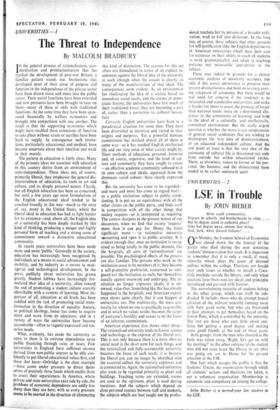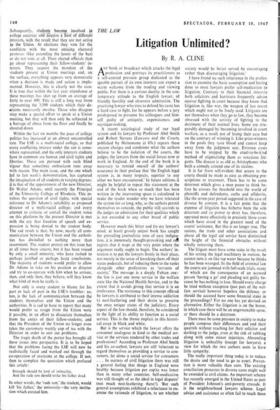LSE in Trouble
UNIVERSITIES-2
By JOHN BIEBER
How could communities,
Degrees in schools, and brotherhoods in cities. . . .
But by degree, stand in authentic place?
Take but degree away, untune that string, And, hark, what discord follows! . .
ON Monday the London School of Economics was closed down for the funeral of the porter who died during the now notorious students' demonstration last week. It is important to remember that it is only a small, if vocal, minority which plays the game of internal politics within the college. Elections arc fought over such issues as whether to install a Coca- Cola machine outside the library; and only when elections have been won arc ideals and principles introduced and pursued with fervour.
The overwhelming majority of students belong to the other group, which can itself be sub- divided. It includes those who do attempt honest criticism of the militant minority running away with their good name, but who are frustrated in their attempts to get themselves heard on the Union floor, which is controlled by the minority. The rest are those who care little about any- thing but getting a good degree and making some good friends at the end of three years.
Both groups, from the man who shouted as the body was taken away, 'Right, let's get on with the meeting!' to the other extreme of the student who did not even leave the library to see what was going on, are to blame for the present situation at the LSE.
One fact which escapes the public is that the Students' Union, the organisation through which all students' actions and decisions are taken, is not a voluntary organisation. Membership is automatic and compulsory on joining the college.
John Bieber is a second-year law student at the LSE.
Subsequently, students become involved in college societies and liquire a cost of different interests, with the result that they are not active in the Union. At elections they vote for the candidate with the most enticing electoral promises (like extending the hours of the bar) or do not vote at all. Their elected officials then go about representing their fellow-students' in- terests. They acquire the mandate of the students present at Union meetings and, on the surface, everything appears very democratic when a decision is made and action is imple- mented. However, this is clearly not the case. It is true that within the last year attendance at these meetings has shot up from an average of forty to over 400. This is still a long way from representing the 3,500 students which their de- oisions necessarily involve. Those who disagree May make a special effort to speak at a Union meeting, but they will then only be subjected to a barrage of abuse from the floor and finally be shouted down.
Within the last six months the pace of college politics has increased at an almost uncontrolled rate. The LSE is a multi-racial college, so that every conflicting interest under the sun is some- where represented, and the only interests students have in common are human and civil rights and liberties. These are pursued with such blind vigour that sometimes enthusiasm runs away with reason. The main issue, and the one which led to last week's demonstration, has captured the imagination of all students in varying degrees; it is that of the appointment of the new Director, Dr Walter Adams, until recently the Principal Of the University College of Rhodesia. This in- volves the question of civil rights, with special reference to Dr Adams's suitability as proposed director of a multi-racial college; and every attempt to criticise or curtail the student voice on this platform by the present Director is met with the cry that freedom of speech and ex- pression is being denied to the student body. The sad result is that, by now, nearly all com- munication between the Union and the authori- ties has dwindled to nothing more than resentment. The student protest on this issue has at all times been sincere, but it has been voiced by only a small minority, who have rushed to perhaps justified or perhaps hasty conclusions. The majority of students would prefer to allow Dr Adams to take on his position as director and try to co-operate with him when he arrives; then, and only then, they believe, will they know what kind of man he really is.
Not only is every student to blame for his part or lack of part in the LSE's troubles: so, too, is the lack of communication between the students themselves and the Union and the authorities. It is sad to have to report that many would prefer to resign from the Union were it possible, in an effort to dissociate themselves from the antics of their fellow-students; and that the President of the Union no longer even takes the customary weekly cup of tea with the Director in order to sort out problems.
The tragic death of the porter has brought all these issues into perspective. It is to be hoped that the problems facing the LSE will now be realistically faced and worked out through the co-operation of everyone at the college. If not, then to complete the quotation which prefaced this article:
Strength should be lord of imbecility, And the rude son should strike his father dead.
In other words, the 'rude son,' the student, would kill 'his father,' the university—the very institu- tion which created him.



































 Previous page
Previous page